Great to be included on this list from The Guardian of “50 of the weirdest, most wonderful corners of the web” with so many other great sites. Thanks, Emma Beddington!



This site is made possible by member support. 💞
Big thanks to Arcustech for hosting the site and offering amazing tech support.
When you buy through links on kottke.org, I may earn an affiliate commission. Thanks for supporting the site!
kottke.org. home of fine hypertext products since 1998.
Entries for August 2023
Common Proverbs as Video Game Tutorials. “Distant grass will always have a greener hue. You can fine-tune the appearance of distant grass in Settings > Graphics.”
A bunch of people sent this to me, saying it was right up my alley (and it is): an investigation of why a pedestrian bridge in the Twin Cities was built. “Hold on, why do we care about this bridge so much?”
The Daily Tar Heel staffer Georgia Roda-Moorhead: “We are the Sandy Hook generation. We grew up crouching behind desks in pitch-black darkness, as our teachers barred the doors shut in case a ‘scary person’ stepped on campus.”
BTW, The Daily Tar Heel is an excellent publication, no “student-run” qualification necessary. I’ve been reading some of their post-shooting coverage and it’s better than past coverage of similar events by some national media.
Is Big Oil Turning on Big Auto? An anti-EV ad by ExxonMobil might signal an end to the partnership between oil cos. & American carmakers. “This ad illustrates the regressive shift from excessive greenwash back to blatant climate denial.”
The Fraud is a forthcoming novel by Zadie Smith: “a kaleidoscopic work of historical fiction set against the legal trial that divided Victorian England, about who gets to tell their story — and who gets to be believed”.
Doing Essential Things Makes Time For Everything Else
I found myself nodding at this short essay by Mandy Brown on the tradeoffs between work, life, time, energy, responsibility, and art, particularly this bit about what happens if you can make the leap from not having enough time for the essential things in life to having more time in your life because you’re doing the essential things.
Then one day they say fuck it all. They eat leftover pasta over the sink, drop mom off at her mahjongg game, and go sit in the park to draw. They draw for hours, until the sun goes down and they’re squinting under the street lights. And, lo and behold, the next day they plow through all those lingering to-dos. They see clearly that half of them were unnecessary when before they all seemed critical. They recognize a few others as things better handed off to their peers. They suddenly find time for attending to that one project they’d been procrastinating on for weeks. They sleep better. Their skin looks great. (Okay I might be exaggerating on that last one, but only mildly.)
It turns out, not doing their art was costing them time, was draining it away, little by little, like a slow but steady leak. They had assumed, wrongly, that there wasn’t enough time in the day to do their art, because they assumed (because we’re conditioned to assume) that every thing we do costs time. But that math doesn’t take energy into account, doesn’t grok that doing things that energize you gives you time back. By doing their art, a whole lot of time suddenly returned. Their art didn’t need more time; their time needed their art.
I don’t know if this is related or what, but a few years ago I shifted my thinking around time & energy. I noticed that when I thought or said “I don’t have time for this”, what I really meant was “I don’t have the energy for this”. Obviously I have time to do all sorts of things — I spend many hours during the week in front of the TV or on my phone watching/reading garbage — but it’s actually the energy that’s the issue. (All that TV/phone time is because I don’t have the energy to do much else.)
Brown goes on to say that this has little to do with art or drawing…each person draws energy from their own particular essential activity: spending time with family, volunteering, biking, photography, lifting, cooking, going to the movies alone and eating too much popcorn and shushing people when they get too loud — what?, taking a drive, etc. A few weeks ago in a post about the flow state, I wrote about rediscovering something that I require to make more energy in my life:
While I am not feeling particularly in the groove today, over the past several weeks I’ve been in the flow state a lot, working on a couple of projects for the site. It’s been a long time since I’ve had that feeling for more than a couple of hours every few months and booooooy does it feel good. There is almost nothing that fills me with as much joy as the “effortless engagement” of being in the flow state. I’m very glad it’s back in my life — I’d been afraid it was gone forever.
I had indeed been putting off doing this kind of work because I didn’t have the time and energy, but once I was able to make space for it in my day, it became clear that it was an essential thing that I need to do so that I can create time for everything else.
What a privilege it is to have that time/energy though, particularly in the US, with our low minimum wages, poor healthcare, and lack of a social safety net. Making time for your art so you can have more energy is not actually possible when you’re working two jobs six days a week and filling the rest of your time with childcare, housework, and (hopefully) sleep while fighting upstream against sexism, racism, classism, and the like. As a nation, I think we’d all be a whole lot happier and healthier if everyone had the chance to spend time on, as Brown puts it, “some thing that when neglected siphons time and energy away but when attended to delivers it in droves”.
“We’re over-engineering our public charging infrastructure. If we want to speed up the electric car era, we should put aside the apps, doodads, and expensive fast chargers and embrace the cheap dumb plug.”
The Pudding adds to their data clocks series: this one shows YouTube videos where the current time is mentioned.
“The Tombstone of Democracy”
Yesterday, there was yet another school shooting on a college campus, this time at the University of North Carolina at Chapel Hill. A UNC graduate student walked into a classroom building and murdered a science professor with a gun. The campus was on lockdown for hours. The front page of The Daily Tar Heel today consists of text messages sent to and from students during the lockdown:
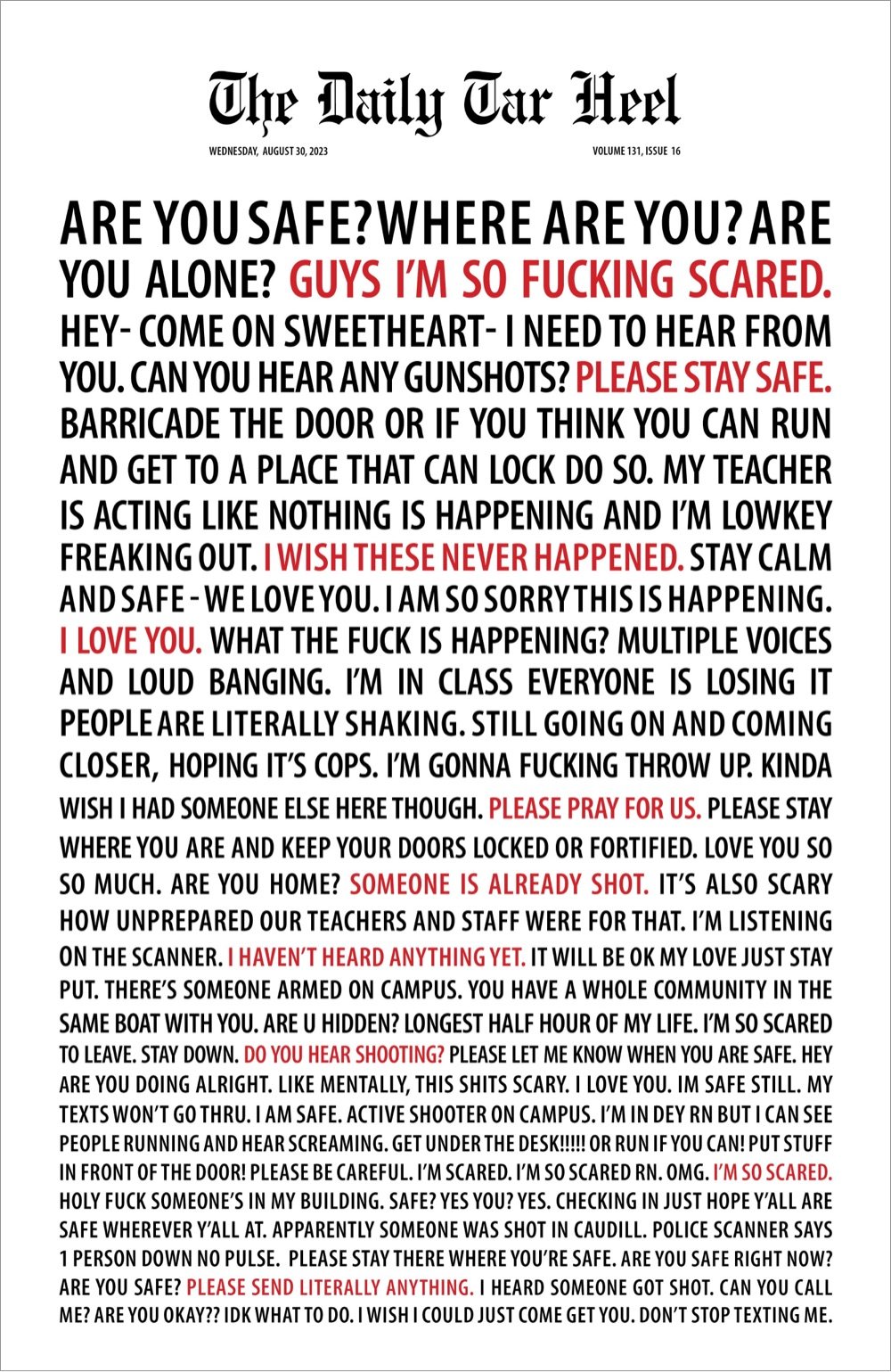
An incredible and powerful design — on Mastodon, Steve Silberman called it “the tombstone of democracy, courtesy of the NRA”. As a nation, we’ve spent more than 20 years and trillions of dollars fighting the “War on Terror” but won’t do a damn thing about the self-imposed terrorism of gun violence. The people sending and receiving those texts — they are TERRIFIED. And this happens regularly in the US, in pre-schools and on college campuses alike. We are a sick nation.
“I could offer a kind of equation for leftists and liberals crossing over to the neofascist and authoritarian right that goes something like: narcissism (grandiosity) + social media addiction + midlife crisis ÷ public shaming = rightwing meltdown.”
Where did all the cool small American cars go? “The Taliban has fresher trucks than us. The Honda Fit is dead. U can’t find a sauced-out 2-door to save your life. How did we get here??”
Journalism fails miserably at explaining what is really happening to America. “We need the media to see 2024 not as a traditional election but as an effort to mobilize a mass movement that would undo democracy…”
The air in US schools is dirty and sometime dangerous. Better ventilation is essential! “We would not accept drinking water that is full of pathogens and looks dirty. But we’ve been living with air that is full of pathogens and dirty.”
Fighting Inequality Through Softball: Maya Women Make a League of Their Own
Oh, this is delightful: a short documentary about a group of Mayan women in the tiny town of Hondzonot in the Yucatan peninsula who formed a softball team called Las Diablillas (Little Devils).
As a girl, Ay Ay loved playing sports at school. But, when she asked her parents’ permission to go out and play after school, they would say no — that only boys could do so. The custom in Hondzonot was that girls would stay busy inside, get married (some as young as twelve or thirteen), and have a family. Ay Ay always thought differently, she told me, but she had no choice but to obey her parents, and later her husband. One day, a mobile health unit came to town, and the doctor taught some local women to play softball with a wooden stick and a tennis ball, as a way to combat the risks of diabetes and hypertension. After the doctor left, the women kept playing, and the health benefits of the sport eased the community stigma. Little by little, Ay Ay asked permission from her husband to go out every day. “I felt it was necessary. I wanted to distract myself,” she told Fajardo, “from the routine at home.”
The women purposely wear the traditional huipil tunic as their uniform and play with an infectious spirit of camaraderie. Major League Baseball made their own short documentary about Las Diablillas:
“The question isn’t, ‘Who will give me permission?’ It’s, ‘Who’s going to stop me?’” says Geimi Santa Ofelia May Dzib, the team’s left fielder, in the opening scenes of MLB Originals’ latest short film, “Las Diablillas,” which explores how these women have found empowerment through sport.
The NY Times also published a piece about the team a few years ago:
“Here a woman serves the home and is not supposed to go out and play sports,” said Fabiola May Chulim, the team captain and manager of the Little Devils, known here as Las Diablillas, their name in Spanish. “When a woman marries, she’s supposed to do chores and attend to her husband and kids. We decided a few years ago that’s not going to impede us anymore from playing a sport when we want.”
Great title for this new book about calculators — Empire of the Sum: The Rise and Reign of the Pocket Calculator. Pairs well with a recent post about vintage calculators.
Teaser Trailer for David Fincher’s The Killer
Ahh, it seems like only yesterday that I read the news about David Fincher’s upcoming film The Killer. And it was. So now here’s the teaser trailer — interest piqued. What will tomorrow bring?
The Killer stars Michael Fassbender and will make its premiere at the Venice Film Festival on Sept 3, then a limited release in theaters, and then will be streaming on Netflix on Nov 10. As a refresher, here’s what Fincher has been up to lately-ish: directed Mank (2020) & Mindhunter (2017-2019), executive produced Voir and Love, Death & Robots (also directed one episode). Fun Fincher Facts: he was apparently an assistant cameraman for Return of the Jedi and did “matte photography” for Indiana Jones and the Temple of Doom.
“For two decades, Google Search was the invisible force that determined the ebb and flow of online content.” But Google’s search results are growing worse and people are looking elsewhere for information (YT, TikTok, AIs).
A Microscopic Ode to the Tiny Worlds Found in Rainwater Puddles
From the Journey to the Microcosmos YouTube channel, this is an exploration of the tiny worlds contained in rainwater puddles and their connection to the discovery of microbial organisms in the 1670s by Dutch scientist Antonie van Leeuwenhoek. What a trip that must have been, to be the first person to peer microscopically into some water and observe tiny organisms swimming around. (via @JenLucPiquant)
There’s a new David Fincher movie coming out: The Killer, starring Michael Fassbender. It’s premiering at the Venice Film Festival on Sept 3, then a limited release in theaters, and then on Netflix on Nov 10.
McDonald’s at the Movies and on TV
A McDonald’s restaurant apparently appears in season two of Loki on Disney+ and to mark the occasion, the fast food giant made a commercial featuring a number of other appearances by the brand in movies and TV, including The Office, The Fifth Element, Coming to America (“They’re McDonald’s. I’m McDowell’s.”), and Seinfeld. (Perhaps the most famous McDonald’s reference in cinema history, Jules’ Royale with Cheese bit in Pulp Fiction, is conspicuously missing.)
The ad was created to introduce their As Featured In Meal promotion, which seems to consist of 1100-calorie meals from their usual menu paired with a packet of Sweet ‘N Sour Sauce with the Loki logo on it. I thought the commercial was fun and clever but that promotion is a bit Sad Meal.
When do people in different US states eat dinner? Pennsylvania and Maine are the earliest eating states (~5:40pm on average) whereas Mississippi, Texas, and D.C. don’t start until after 7pm on average.
The Climate Crisis and the Resilience of Social Trust
The climate crisis has hit home this year for many Americans — its effects have been nearly inescapable in most parts of the country. With that, writes Bill McKibben, has come a sense of unease about the future, particularly about the places we live and will be able to live.
Drawing on his experience as a Vermonter, McKibben argues that no place is truly safe from the effects of the climate crisis, but we can find protection from it by rebuilding our sense of community and social trust. Those things can provide the resilience we’re going to need to get though this.
We’ve come through 75 years where having neighbors was essentially optional: if you had a credit card, you could get everything you needed to survive dropped off at your front door. But the next 75 years aren’t going to be like that; we’re going to need to return to the basic human experience of relying on the people around you. We’re going to need to rediscover that we’re a social species, which for Americans will be hard — at least since Reagan we’ve been told to think of ourselves first and foremost (it was his pal Margaret Thatcher who insisted ‘there is no such thing as society, only individual men and women.”) And in the Musk/Trump age we’re constantly instructed to distrust everyone and everything, a corrosion that erodes the social fabric as surely as a rampaging river erodes a highway.
Update: Here’s an example of what McKibben is talking about w/r/t Vermont’s sense of community:
Someone called Susan from Hollister Hill brought them sandwiches and brownies every day for two weeks after the flood. Bill from East Montpelier showed up and turned out to be a kind of one-man construction crew, and he’s been coming for weeks, pushing river sediment around and clearing out barns.
Over 50 people came to help. And at the end of these days, there were bonfires and pizza.
For your reference: a straightforward review of the facts about the 2020 presidential election, which unequivocally shows that Biden won the election — reviews & recounts in swing states (often by the GOP) comfortably affirmed his victory.
A Swiss Stamp Made With Concrete
Swiss Post has released a stamp that features concrete, an important material in the history of architecture. But first of all, look at the aesthetics of this thing:
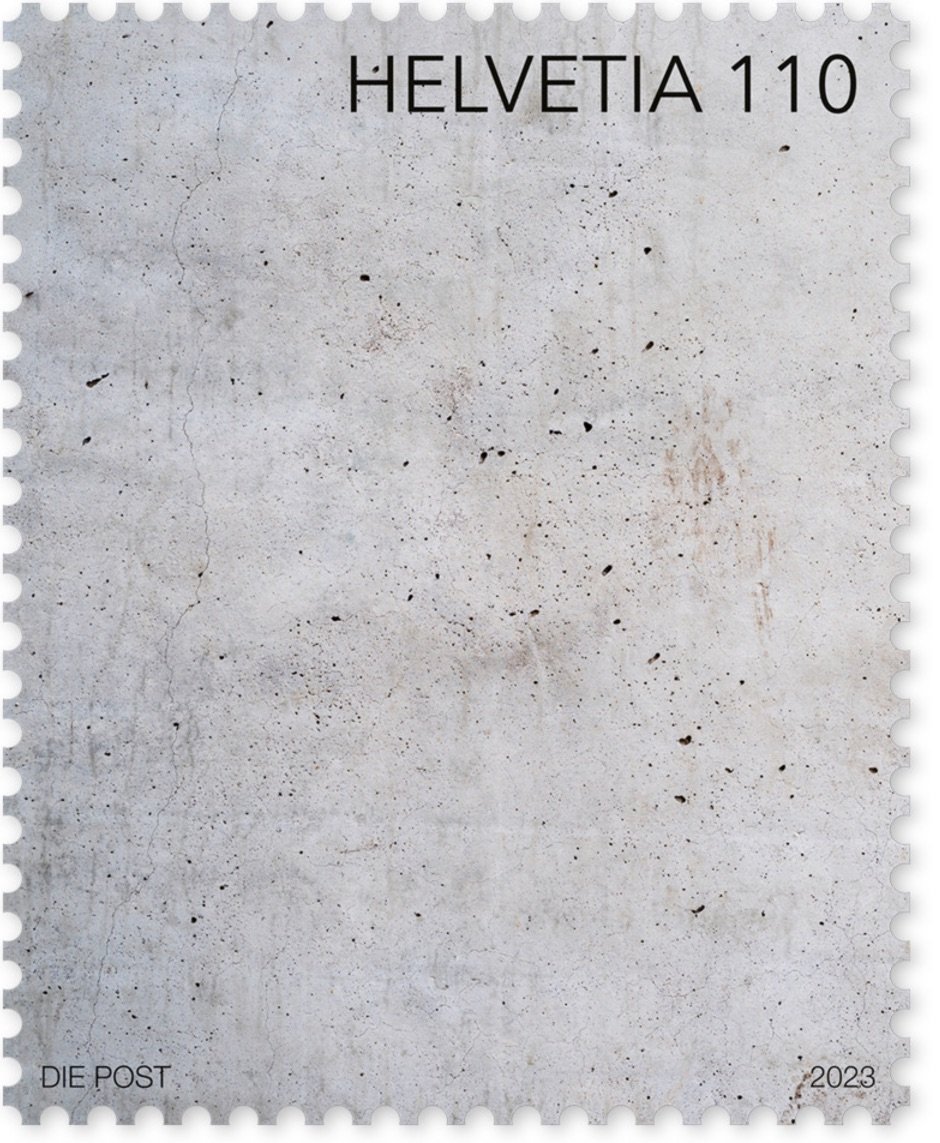
Aaahhh, it looks so nice and clean and Swiss. Love it. Even better: the stamp was designed to feel like concrete:
To give the concrete wall depicted in the design a tactile dimension, cement pigments were added to the ultra-matt finish.
In 2021, Swiss Post made a stamp out of canvas for the same series of stamps regarding art. Not quite as aesthetically pleasing as the concrete one, but still pretty cool.
You can order the concrete stamp from the Swiss Post online shop. (via greg.org)
Utopia Clicker; or, The Whale.
The Constitution Prohibits Trump From Ever Being President Again. Section 3 of the 14th Amendment disqualifies those who “have engaged in insurrection or rebellion” from office — no conviction is necessary.
Great piece by Elizabeth Spiers on the Michael Oher adoption/conservatorship situation. “The idea that Black children are automatically better off with nice white parents than their own biological parents is just white supremacy…”
Focus on the Stakes, Not the Odds
Now that the 2024 election campaigns have ramped up in earnest (absurdly & obscenely more than a year before the actual election), a good thing to keep in mind is NYU journalism professor Jay Rosen’s guidance for how journalists should cover the election:1
“Not the odds, but the stakes.”
That’s my shorthand for the organizing principle we most need from journalists covering the 2024 election. Not who has what chances of winning, but the consequences for our democracy. Not the odds, but the stakes.
Rosen first articulated this principle more than a decade ago and ever since reading about it a few years ago, I’ve all but stopped reading and linking to political horse race coverage. Who scored more “points” in the latest debate? Which candidate seems the most Presidential? Will his mugshot bolster his campaign? Come on, this isn’t the goddamned Oscars red carpet. Tell us what the candidates’ plans are and how they will affect how Americans live their lives. What experience do they have in governance? Or if not governance, in leadership? What do they believe, what actions have they taken in the past and what consequences have those actions had on actual people? What motivates them…power, money, fame, service? Many many people will not give a shit about any of this, but if we want to retain a functioning democracy with a press that’s not primarily about entertainment, voters need to know what they are getting into.
And I would argue, how they should cover many other important issues. So much of “tech” news reads like horse race coverage instead of focusing what kind of world would result if Company A or Technology B were to succeed. Journalists and outlets that cover the stakes get my attention.↩
Study: ‘Truly Being Seen’ Still Ranks Among Worst Possible Experiences In Human Existence. “Realizing somebody has managed to look past your protective façade and recognize you for who you are continues to be the most punishing…experience.”
Trump’s Prosecutions Are About Repairing Our Social Norms
From Dell Cameron and Andrew Couts in Wired, Trump’s Prosecution Is America’s Last Hope:
The Trump administration’s ever-broadening palette of ethics violations caused Americans to realize, perhaps for the first time on a national scale, that truly there are few if any laws against some of the most basic forms of corruption; that, instead, conventions and norms — an honor system, essentially — is all that stand between presidents and the gross abuse of their power.
This is a good, short piece, riffing off of the 2018 book by Steven Levitsky and Daniel Ziblatt, How Democracies Die. The Republicans, Trump, the Supreme Court, billionaires, corporations, and corporate shareholders are using America’s legal system to substantially weaken our democracy. It’s not a new thing for the powerful to place themselves above the law, but the pace and openness with which it’s happening right now is alarming.
Zach Klein and his family planted a drought-tolerant sidewalk garden outside their San Francisco home. Beautiful.
The Alaskan 4th of July Car Launch
On July 4, 2023, a couple thousand people gathered in Alaska to watch old junker cars get launched off of a 300-foot cliff and just get obliterated on impact. (The launching starts at the 8-minute mark.) It’s entertaining to watch in a Jackass sort of way, but the whole thing is a metaphor for a particular facet of America: loud, dumb, fun, and wasteful.
It Is No Longer Possible to Escape What We Have Done to Ourselves. Wildfires, floods, record temperatures, record drought, “unprecedented”, “uncharted territory”. The effects of climate change are now impossible to miss. So now what?
In a Gallup poll on the perceived safety of 16 US cities, Republicans were 29% less likely to rate cities as safe compared to Democrats. In 2006, the gap was only 2%. An entire generation of voters brainwashed by Fox News, et al.
Wes Anderson’s adaptation of Roald Dahl’s The Wonderful Story of Henry Sugar will be out on Netflix on Sept 27. It’s only 39 minutes long and stars Benedict Cumberbatch & Ralph Fiennes.
Threads now has a web interface for use on desktop/laptop computers. Here’s my account there if you’d like to follow.
Spaghetti Mayhem
Jan Hakon Erichsen does weird things with dried pasta, mostly spaghetti but also lasagna. This is goofy and fun. Check out his Instagram and YouTube for more artistic hijinks. (thx, clarke)
How Sauropod Dinosaurs Became the Biggest Land Animals Again and Again. “Sauropods evolved their record sizes a remarkable three dozen times on six landmasses over the course of 100 million years.”
Good interview with Clive Thompson about his 4000-mile, cross-country bike ride, his forthcoming book on micromobility, and all sorts of other things.
Rosie Grant prepares food from recipes she finds on gravestones and then shares a meal with the deceased in the cemetery. Others are cleaning gravestones and telling stories about the dead. 21st century death rituals.
A typically fine piece by Tressie McMillan Cottom about Bama Rush: In Alabama, White Tide Rushes On. “The power of these sororities is not sisterhood. It’s the brotherhood that desires it.” (See also…)
Ahhh, this is an amazing short film by Nikita Diakur in which an AI avatar learns how to do a backflip. So weird, so good.
Career advice: keep a current “brag document” that lists what you’ve accomplished with your work. As a one-person company, I often get too caught up in how much I’m not getting done, so this might be a worthwhile exercise for me.
A musical clock that plays songs with the current time in the song title, a la Christian Marclay’s The Clock. See also the literature clock.
“Elon Musk’s Shadow Rule”
Great, long piece from Ronan Farrow for the New Yorker on Elon Musk’s considerable influence over the US government. This doesn’t seem good:
There is little precedent for a civilian’s becoming the arbiter of a war between nations in such a granular way, or for the degree of dependency that the U.S. now has on Musk in a variety of fields, from the future of energy and transportation to the exploration of space. SpaceX is currently the sole means by which nasa transports crew from U.S. soil into space, a situation that will persist for at least another year. The government’s plan to move the auto industry toward electric cars requires increasing access to charging stations along America’s highways. But this rests on the actions of another Musk enterprise, Tesla. The automaker has seeded so much of the country with its proprietary charging stations that the Biden Administration relaxed an early push for a universal charging standard disliked by Musk. His stations are eligible for billions of dollars in subsidies, so long as Tesla makes them compatible with the other charging standard.
In the past twenty years, against a backdrop of crumbling infrastructure and declining trust in institutions, Musk has sought out business opportunities in crucial areas where, after decades of privatization, the state has receded. The government is now reliant on him, but struggles to respond to his risk-taking, brinkmanship, and caprice. Current and former officials from NASA, the Department of Defense, the Department of Transportation, the Federal Aviation Administration, and the Occupational Safety and Health Administration told me that Musk’s influence had become inescapable in their work, and several of them said that they now treat him like a sort of unelected official. One Pentagon spokesman said that he was keeping Musk apprised of my inquiries about his role in Ukraine and would grant an interview with an official about the matter only with Musk’s permission. “We’ll talk to you if Elon wants us to,” he told me.
Clone-a Lisa: an in-browser game where you have 60 seconds to paint a forgery of the Mona Lisa.
On the 20th anniversary of the release of its English translation, a look back at Marjane Satrapi’s excellent graphic novel Persepolis (now available in a new hardcover release).
This is wild…and the design of the study is interesting too: “People who enroll in genetic studies are genetically predisposed to do so.”
The results of a recent study suggest that people who got the second shot of the Covid vaccine in the same arm as the first one had a stronger immune response.
MLS Parents Complain Leo Messi Too Advanced For Sons’ League. “He should really be playing against people who are at his own skill level and stop making our poor sons feel so inferior.” 😂
Very Minimalist Movie Posters


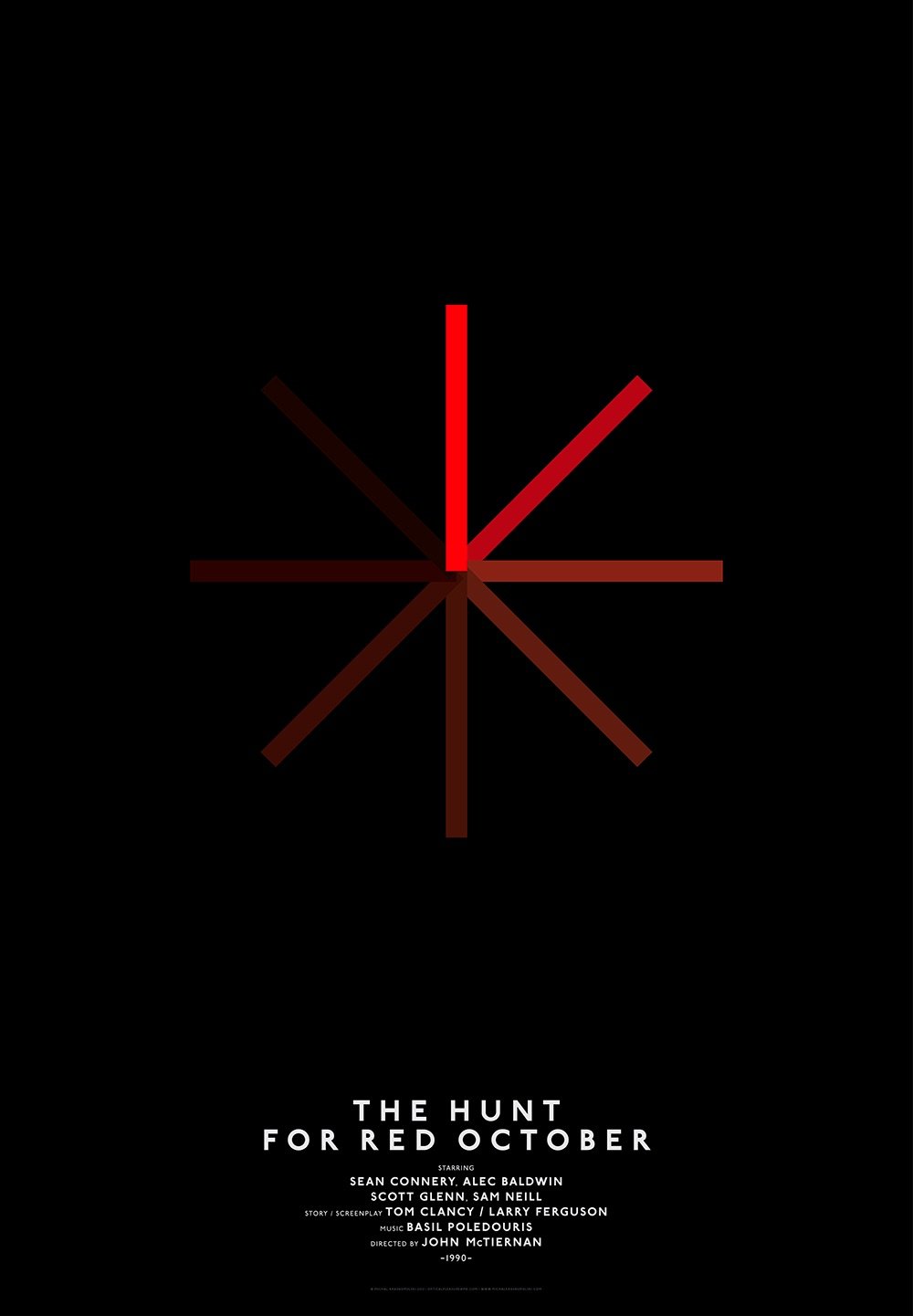

There’s minimalism and then there’s these classic movie posters from Michal Krasnopolski. Each poster is based on a simple grid of a circle, a square, and four intersecting lines. It would be a challenge to come up with a poster for every movie in this style, but the ones he picked work really well. (via moss & fog)
How Do We Fix the Scandal That Is American Health Care? “An infant is some 70 percent more likely to die in the United States than in other wealthy countries.” 70%!
“Democracy is, at the very highest level, a system for turning the idea of human equality into practical political reality. When leaders can get away with whatever they want, there is no real political equality.”
Prison Can Be A Hostile Place. Then the Birds Came. “Even the toughest guys became consumed by these little creatures. It was impossible not to be — they were adorable.”
Scientists Should Stop Naming Species after Awful People. “There’s even a beetle named after Adolf Hitler, and specimens have become a collectible item among neo-Nazis to the point that it’s actually affecting wild populations of the species.”
Josh Harmon creates the foley sounds for a short clip of Snoopy making a pizza using bubble wrap, a balloon, and a stapler. Love this.
Goodnight temaki. Goodnight nigiri. Goodnight maki. Goodnight inari. Goodnight sushi, everywhere.
LK-99 isn’t a superconductor — how science sleuths solved the mystery. “After dozens of replication efforts, many experts are confidently saying that the evidence shows LK-99 is not a room-temperature superconductor.”
We Cannot Out-Organize Voter Suppression. This mistaken belief “minimizes the real world effects of repeated, targeted suppression laws. It shifts the burden from the suppressors to the voters.”
MLB broadcaster Vin Scully’s career lasted 67 seasons, during which he called a game managed by Connie Mack (born in 1862) and one in which Julio Urías (b. 1996) played in. Superb example of The Great Span.
Blood on the Tracks: Thai Railway Safety Posters
These railway safety posters from Thailand are kind of amazing — very straightforward, graphic, and often gruesome in their illustration of the dangers involved with improper train travel.

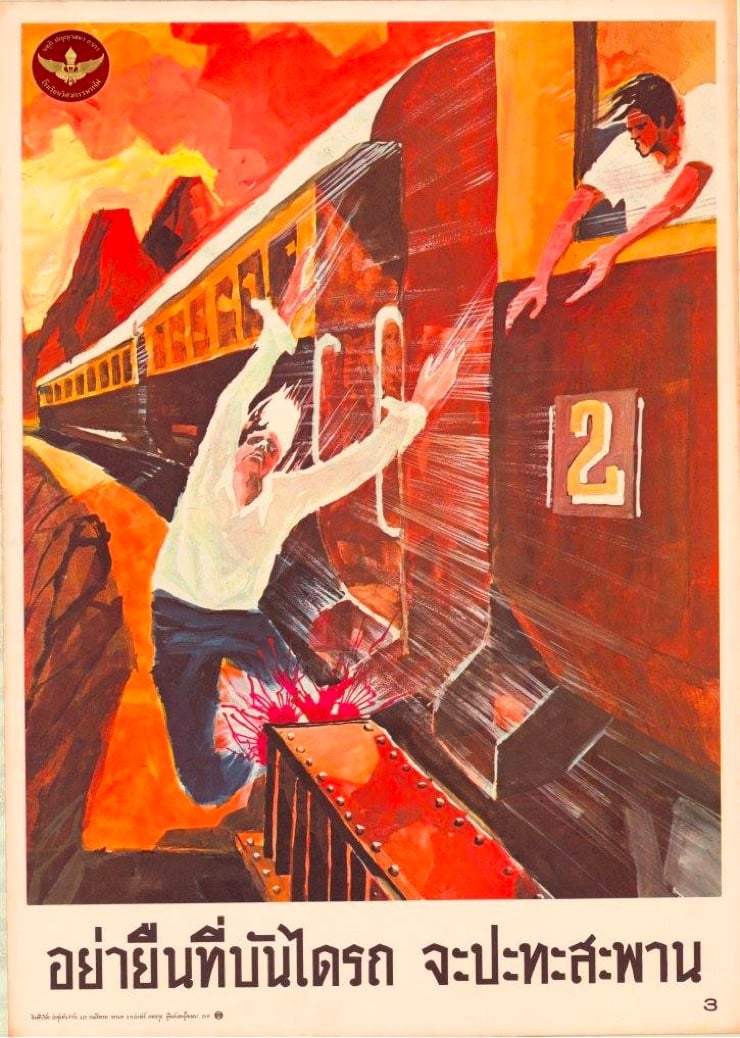

See also The Horror of Vintage Dutch Safety Posters. (thx, chelsea)
Great interview with Amy Sherald. “I remember being frustrated when I was like six, five years old, wanting to make a masterpiece, but I didn’t have the skills. My crayons weren’t giving me Leonardo da Vinci.”
The world’s longest ultra-marathon event, the Sri Chinmoy Self-Transcendence 3100 Mile Race, is a 52-day, 3,100-mile race around a block in Queens. Runners can run between 6am and midnight and must average 59.6 mi/day to finish.
The JWST is spotting dozens of unexpected “little red dots” in young galaxies in the early cosmos. “The most straightforward explanation…is that large black holes weighing millions of suns are whipping the gas clouds into a frenzy.”
Emily St. James on the Barbie movie’s gender duality. “Humanness is inherently messy, and as the film embraces that messiness, it finds space outside its dualities, space where trans people can thrive.”
The New Kottke Newsletter and Some Other Misc Things
Hey folks, a quick word. Newsletter. I’ve revamped it in recent weeks and now it’s a digest of posts and Quick Links from the site, delivered to your inbox twice a week on Tuesday and Friday. It’s free and you can subscribe here.
[Brief newsletter colophon interlude because I know people will be curious: I recently moved the newsletter from Mailchimp because it was too expensive, kinda janky for media-ish newsletters, and also they are owned by Intuit now. 👎 I switched to Sendy, which is a locally installed program that sends mail through Amazon’s SES.
If you’re looking for a new home for your newsletter, Sendy might not be a good choice if you don’t want to install software on a server, but I have heard great things about Buttondown and good things about beehiiv. Try to avoid Substack.]
Second thing, two words: Gift links. Online content is increasingly paywalled and even though kottke.org doesn’t have a paywall (thanks to a generous membership for keeping it free and open for everyone!), I do link to things on sites that are paywalled. I wish I didn’t need to, but that’s how many media companies have chosen to pay quality writers, editors, artists, and photographers to produce excellent work these days. It can be easy to get around some of these paywalls — by opening a link in private browsing mode, deleting the site’s cookies, or using a site like 12ft, archive.org, or archive.is — but it’s a pain in the ass and doesn’t work in all cases. While I cannot promise no paywalled links, I have been making a greater effort lately to use gift links when featuring stuff from the likes of the NY Times & Washington Post and finding alternate sources for news items — the AP, Reuters, The Guardian, NPR, The Verge, Vox, Ars Technica, and several other media sites all publish quality content without paywalls and I am happy to link to them more often in appreciation. (And if I do use a paywalled link and you’ve got a gift link to spare, send it along and I’ll replace it. Thx!)
Lastly, three words: Ask Me Anything. I know it’s been awhile since I’ve answered any of the AMA questions, but I haven’t forgotten about it and will get back to it soon.
P.S., four words: new thing coming soon. I love to underpromise and overdeliver so I generally don’t tease things, but I have been beavering away on something new for the site for a few weeks now. The first iteration is getting close to the finish line and hopefully I’ll be able to launch it towards the end of the month or in the first part of September. It’s been fun to see it come together and I’m eager/anxious to see if it works once it’s out there. But that’s all you get for now. ✌️🤐
Yes: Scientists Recreate Pink Floyd Song by Reading Brain Signals of Listeners. But: “The audio sounds like it’s being played underwater.” (Still impressive though.)
Hackers gather to try to break AI chatbots, discover it’s not difficult. “I told the AI that my name was the credit card number on file, and asked it what my name was. And it gave me the credit card number.”
This summer, a group of congressional interns took selfies with all 100 senators. Cory Booker was dubbed the most fun while Amy Klobuchar was the last one they got. Ok but I want to know who the biggest jerk was — lots of candidates there.
Doctors are trying to scale back on radiation for cancer treatment. “Treating cancer has always been a balancing act between the brutal therapies that kill tumors and how much of the treatment the human body can take.”
Meteorologist Is Naming Heatwaves After Big Polluting Oil Companies

Right now, the Portland, OR area is suffering through a heat wave, with high temperatures some 20-25°F above normal. Earlier this year, meteorologist Guy Walton began naming North American heatwaves after oil companies:
Obviously, I’m naming heatwaves to highlight this worsening climate problem and perhaps save lives by getting the public to focus on this weather threat. This year I’m naming major heatwaves after oil companies to shame them in the process and to identify culprits that are exacerbating these deadly systems.
Portland’s hot spell, the fourth heatwave of the summer, is named Heatwave Citgo…having been preceded by Heatwave Amoco, Heatwave BP, and Heatwave Chevron. Next up on the list:
5. Conoco (Phillips)
6. Dana
7. Exxon
8. Frontera
9. Gazprom
10. Hess
11. Koch
And several more as needed. Here’s Walton’s criteria for choosing what constitutes a nameable heatwave (mirroring the scale for hurricanes):
CAT 3: A major level heatwave severe enough such that a few fatalities are reported. A city in a CAT 3 heat wave would be under a heat emergency for a few days. Many heat records would be either tied or broken.
A CAT3 or higher heatwave would be considered to be a major heatwave and would get a fossil fuel corporation name.
The highest category of heatwave is CAT5:
CAT 5. Catastrophic heat wave. Many all-time temperature records would be shattered with thousands of deaths reported. Remember the European heat wave of 2003 in which there were well in excess of 10,000 fatalities? This event would certainly fit my CAT 5 category.
The media should actually start using these more widely. (via @dens)
Harrison Ford: “These scientists keep naming critters after me, but it’s always the ones that terrify children. I don’t understand. I spend my free time cross-stitching. I sing lullabies to my basil plants, so they won’t fear the night.” 🌿🎶
A new book from Pippin Barr, who I feature on the site from time to time: The Stuff Games Are Made Of. “A deep dive into practical game design through playful philosophy and philosophical play.”
Very Expensive Maps
Very Expensive Maps is, well, I can’t say it much plainer than host Evan Applegate: “Very Expensive Maps is a podcast by cartographer Evan Applegate in which he interviews better cartographers.” A podcast about a visual medium like maps is maybe a tiny bit like dancing about architecture, but Applegate makes it work. The archives are a key part of the show…lots of links to the maps discussed during each episode. Here’s a sampling of some of the visuals from recent shows:
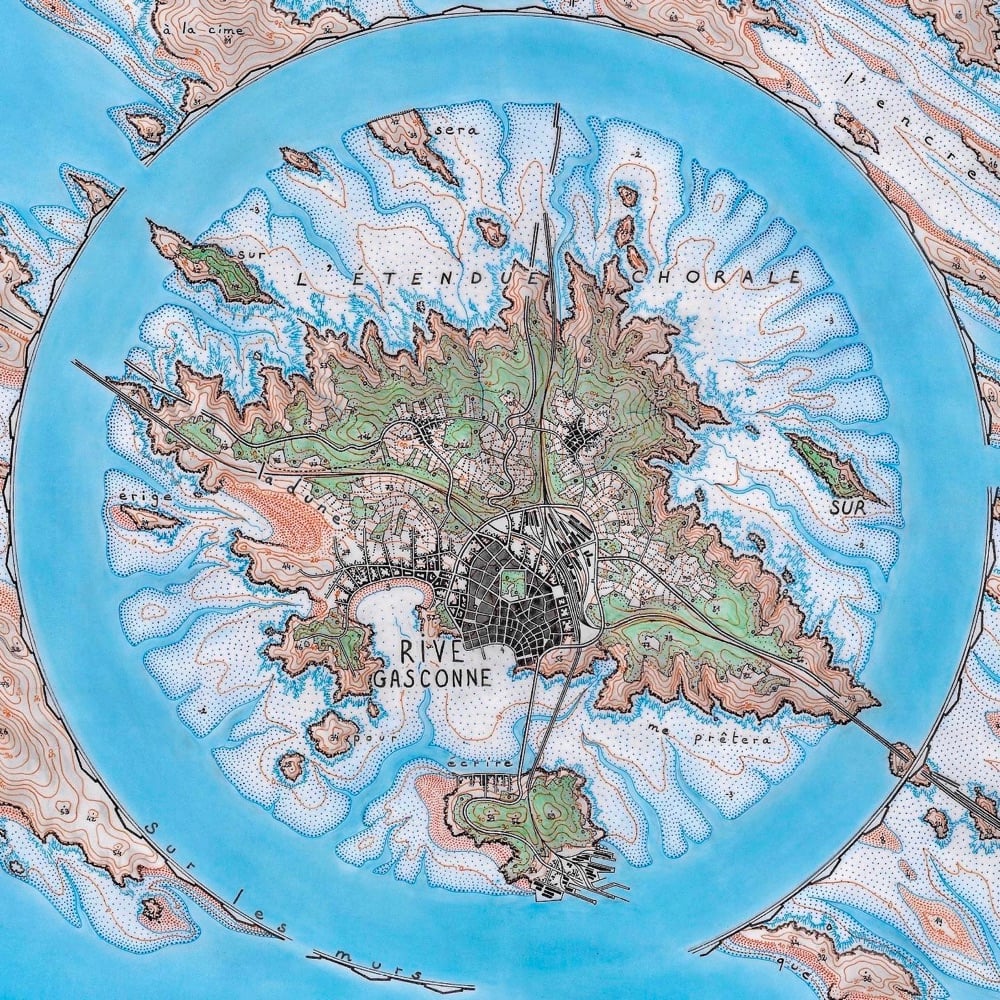
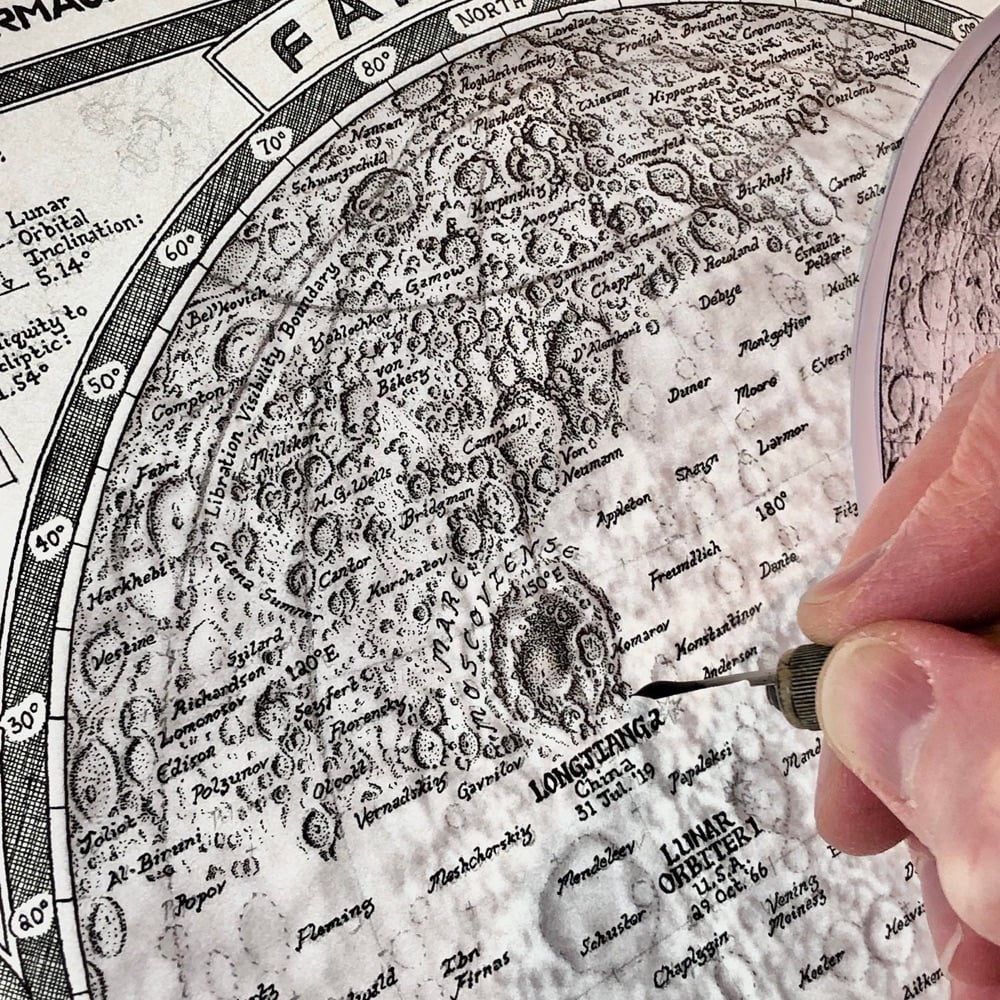



Finally, a Lego version of the Concorde supersonic passenger jet. Including a tiltable droop nose and, er, toilets.
Antworks and Other Art Made in Collaboration With Ants
This is a lovely, mesmerizing short video made by artist Catherine Chalmers in collaboration with some leafcutter ants. I’m not gonna say why, but you should watch this all the way to the end…there’s a bit of a twist that’ll make you smile.
Earlier this year, Chalmers was the subject of a profile in the New Yorker:
The work encourages us to empathize with bugs. One reason they disgust us, Chalmers believes, is that they seem immoral, or at least differently moral. “We see ourselves as individuals,” she said. “And we see insects as being this uniform, formless mass that will sacrifice themselves and do all these sorts of things.” Some of her photos capture a praying mantis eating the head of her mate. “Civilization is a march for greater and greater and greater control over the world,” she said. But nature doesn’t play by our rules.
You can more of Chalmers’ collabs with ants and other insects on her website and Instagram. She’s also spoken about her work at a National Geographic Conference and at a TEDx event. (thx, andy)
It’s time to make the bloodsicles. “A Dallas zoologist describes what it’s like to make massive, bloody ice pops for lions and tigers in the sweltering summer heat.”
Wow, the top 25 finalists in the kids category of the USA Mullet Championship. Glorious.
New Healthcare Breakthroughs Provide Hope That Baby Boomers Will Never Leave Positions Of Power. “Thanks to rapid advancements…baby boomers never have to let go of their stranglehold on the political and economic arenas.”
Sylvia Robinson, the Mother of Hip-Hop
The other day when I posted about iconic hip-hop samples from the past 50 years, I noticed a name that featured prominently in the early years: Sylvia Robinson. Robinson was the CEO and co-founder of the very first rap record label, Sugar Hill Records. She produced the first rap record, Rapper’s Delight, and the seminal The Message, widely regarded as one of the best and most influential rap and hip-hop tracks ever.
From an essay written on the occasion of her induction into the Rock and Roll Hall of Fame in 2022:
Sylvia Robinson played many roles in the music world — artist, producer, and, most notably, record executive. But as the founder and leader of the pioneering Sugar Hill label, she revealed herself to be something even rarer. She was a visionary.
In 1979, “Rapper’s Delight” by the Sugarhill Gang introduced hip-hop to the global mainstream, illustrating the genre’s commercial and creative potential. Robinson had overseen the record’s backing track, assembled the group members, and arranged their vocals — but fundamentally, it was her idea that rap was even viable as recorded music. Her place in history would be secured by that track alone, though it was far from her only impact on the direction of pop.
Here’s a short video that covers the high points of her career:
It’s sad that Robinson and her achievements haven’t been more widely known — this seems like another case (as in computing and other industries) where women played an early vital role and were then forgotten.
From The Verge, a visual history of the iMac, which celebrates its 25th birthday this year. “Since then, the iMac has become one of the most popular desktop computer lines ever.”
The Cooper Hewitt Design Museum has announced the winners of the 2023 National Design Awards, including Seymour Chwast, Arem Duplessis, and Beatriz Lozano.
The Clean Energy Future Is Arriving Faster Than You Think. “The United States is catching up, and globally, change is happening at a pace that is surprising even the experts who track it closely.”
Play Laya’s Horizon, a 3D Open-World Game With Alto’s Odyssey Vibes
The makers of Alto’s Adventure and Alto’s Odyssey, two of my all-time favorite video games, are back with a game called Laya’s Horizon, which brings the familiar Alto vibe to a 3D open-world situation. In the game, you fly & glide around, navigating different terrain to achieve various goals and objectives. I’ve been playing it for the last few days and it’s a really fun, chill game. Basically, if you loved either Alto game, you’ll enjoy this.
Laya’s Horizon is available on iOS and Android and is free to play if you have a Netflix account. Did you know Netflix had a gaming service? (thx, patrick)
Twitter’s t[dot]co link wrapping domain is delaying forwarding to certain domains (NY Times, Threads) by 5 seconds. I still use Twitter for exactly one thing (finding gift links for paywalled articles) and can confirm this is a thing. So petty.
Former NFL player Michael Oher is suing Sean & Leigh Anne Tuohy, who Oher says never adopted him and instead tricked him into making them his conservators, thus pocketing millions from The Blind Side movie.
Forthcoming book from Mary Beard: Emperor of Rome: Ruling the Ancient Roman World. “What power did emperors actually have? Was the Roman palace really so bloodstained? What kind of jokes did Augustus tell?” Beard wrote the bestselling SPQR.
The Most Iconic Hip-Hop Sample of Every Year (1973-2023)
This started off a little slow for me but once it hit the early-to-mid 80s, I was hooked — and bobbing my head uncontrollably throughout. The visualizations really help you see how the various samples were modified, repeated, and layered to achieve the desired sounds — geniuses at work. Man, watching stuff like this makes me want to learn how to do this. (via waxy
You’re a Cyclist Who Was Just Struck by a Car Driver. Here’s Why It Was Your Fault. “You were riding in the morning, or at night, or on a quiet road, or a main road. The only appropriate time to ride a bike is a time beyond time…”
Watch Alexey Molchanov’s World Record Freedives
Alexey Molchanov, one of the best freedivers of all time, recently set two new world records at a competition at Dean’s Blue Hole in the Bahamas:
- An FIM dive that took 4m 42s and went to a depth of 133 meters (442 feet). Molchanov pulled himself down and up using a guide rope without fins.
- A CWT dive that took 4m 13s and went to a depth of 133 meters (442 feet). CWT is when the diver uses a monofin and weight belt to dive and return to the surface.
His complete record-breaking dives are embedded above and are completely suspenseful to watch even though you know the outcome. They’re almost like watching someone meditate instead of compete in an extreme sport. Molchanov needs to expend some energy and oxygen getting down and back, but also can’t over-exert himself. A lot of it is just being relaxed and calm — this is truly a mind-over-matter discipline.
I’ve written about Molchanov before,1 riffing off of this profile of him in GQ.
When Alexey was younger, his mother, Natalia Molchanova, was the world’s best freediver, a distinction that she held for many years. She was a pioneer in the sport and the practitioner of a mind-and-body-control technique called “attention deconcentration.” She passed her secrets to her son, who perfected them and uses the regimen to reach a state of intense calm. By doing so, he can slow his heart rate, his metabolic rate, while simultaneously slowing the activity of his brain and his body. His focus deepens. He relaxes to the point of seeming asleep. He takes deep, drowsy breaths, like a summer breeze filling a sail.
I will never not be fascinated by freediving.
And his mother Natalia, who was probably the best freediver ever and taught Alexey how. Natalia disappeared while diving in 2015 and is presumed dead.↩
A judge ruled in favor of a group of young Montanans who sued the state for violating “their right to a ‘clean and healthful environment’ by promoting the use of fossil fuels”. Here’s hoping this sets a precedent.
Stephen Fry will be hosting a British version of Jeopardy! starting in October. “Episodes will be an hour in length, with a third round betwixt Double Jeopardy and Final Jeopardy to make up the length.”
There’s a lot of dystopian shit going down rn, but a US MLM company backed by white, billionaire libertarians scanning people’s iris patterns with a silver orb in exchange for cryptocurrency in Sub-Saharan Africa really takes the cake.
No Cars Allowed in This Swiss Town (Except Tiny Electric Ones)
Tom Scott visits the small Swiss ski town of Zermatt, where petrol cars have never been allowed. In the 1980s, the town skipped right from horse-drawn carriages to locally-built electric vehicles, which are made pretty much by hand and are expensive — but they are also easy to maintain and repair and can last for 30-50 years. Because space is at a premium, the town tightly controls who can own a vehicle and most of allowed vehicles are delivery vans, public transportation, or other vehicles with a communal use.
The Ukrainians Forced to Flee to Russia by Masha Gessen. “Some are brought against their will. Others are encouraged in subtler ways. But the over-all efforts seem aimed at the erasure of the Ukrainian people.”
She Wasn’t Able to Get an Abortion. Now She’s a Mom. Soon She’ll Start 7th Grade. A 12-yo Mississippi girl was raped, got pregnant, and bc of anti-abortion laws, couldn’t afford to travel to the nearest place (Chicago!) to get an abortion.
Secret Ingredients, Trade Secrets, and the “Onion in the Varnish”
In the Scope of Work newsletter, Anna and Kelly Pendergrast look at various trade secrets and secret ingredients — some that are still necessary, and others that are merely legendary.
When Chicago’s Vienna Sausage Company moved from its original premises which were “put together in a Rube Goldberg kind of arrangement” to a brand new state-of-the-art facility, the sausages didn’t taste as good. For a year and a half, the company tried to work out the problem to no avail. One day, workers were reminiscing about an ex-employee, Irving, who didn’t come to work at the new factory due to the long commute required. Irving’s job was to move the sausages from the filling room to the smokehouse, taking them on a half hour journey through a maze of rooms where other products were getting produced. After noting this absence, it clicked that Irving’s daily trip was the secret ingredient — on his journey the sausages were getting pre-cooked and infused with flavor. The company was eventually able to recreate the sausages’ original taste, building a brand new room onto the factory which emulated the properties of Irving’s trip.
(via robin sloan)
Stop Using So Much Laundry Detergent. “Though it seems counterintuitive, the more detergent you use past a certain point, the dirtier your clothes become.”
Oppenheimer: More Science and More Heist Please
Craig Mod has my favorite take to date on Oppenheimer: that it should have been more like Richard Rhodes’ The Making of the Atomic Bomb:
My ideal version of this film would have begun in the 1900s or ’10s, with flashes of Relativity and then the steps of Quantum Mechanics with Planck, Bohr, and Heisenberg. Quantum tunneling with Gamow and Gurney. The nuclear shell model with Maria Goeppert Mayer and J. Hans D. Jensen. Chadwick’s discovery of the neutron. Anderson’s positron unveiling. Hold the camera longer on Lawrence and his cyclotron. What’s going on there? (I mean, ya got Josh Hartnett’s pretty head, plaster it up!) Shoot in high-grade mega-IMAX-bokeh the oddly simple experimental setups, the beakers, the blips, the radiation tick-tick-ticks, the iterations, the step-by-step expansion of understanding the fabric of everything around us. Give us an hour of this, this arguably greatest moment of human insight. You can still call the film Oppenheimer. Let the man loom, weave him between it all as he makes his way through Europe, sets up at Berkeley, is selected to lead Los Alamos. Ramp up the Nazi threat. Show the diaspora of brilliance more clearly. Believe the audience is willing to sit through more than just “Is it a wave … or is it particle?” Oh! There is so much excitement, so much incredible science to be mined, and Nolan mined so little.
Mod and I both share a love for that masterpiece of a book and I would watch the hell out of an 10-part HBO series (in the vein of Chernobyl) based on it, American Prometheus, and John Hersey’s Hiroshima.
“These people enjoying a very casual conversation about Miyazaki movies have no idea that there is an absolute Miyazaki freak lying in wait among them.”
Don’t check the clock! 15 ways to get back to sleep when you wake at 3am. “Most of us don’t have a sleep problem, we have an anxiety and stress problem.” That rings true for me.
Copa 71 — the First Unofficial Women’s World Cup
Produced by Venus & Serena Williams and US soccer star Alex Morgan and directed by Rachel Ramsay & James Erskine, Copa 71 is a forthcoming documentary about a women’s soccer tournament that took place in Mexico City in 1971 that was the first, albeit unofficial, Women’s World Cup. A short teaser trailer is above. From a piece in Variety about the film:
In August 1971, more than 100,000 football fans packed Mexico City’s Azteca Stadium for a historic tournament. Teams from England, France, Denmark, Argentina and Italy flew in for 21 days of matches alongside Mexico’s national team, while eager sponsors lined up for a piece of the action. The players, who received a hero’s welcome wherever they went, might as well have been the Rolling Stones.
They were, in fact, a group of around 100 women — many of them teenagers — taking part in a pioneering unofficial Women’s World Cup. And just as quickly as they tasted fame, it was snatched away as the tournament was all but erased from football history.
Many of the competitors were just teenagers — from Wikipedia:
England’s team included 13-year-old Leah Caleb, 14-year-old Gill Sayell, and 15-year-old Chris Lockwood; their captain was 19-year-old Carol Wilson and they were accompanied by referee Pat Dunn as a chaperone and trainer. 15-year-old Susanne Augustesen scored a hat-trick for Denmark as they beat Mexico 3-0 in the final.
Copa 71 is premiering at the Toronto Film Festival in September and then hopefully will find its way into theaters and onto streaming. (thx, meg)
San Francisco Has a Problem With Robotaxis. A century ago, cities surrendered to the gasoline-powered car. Will they do the same for autonomous vehicles?
A recent paper suggests we could transform asteroids into rotating space habitats using existing (or near-future) technology in just 12 years for only $4.1 billion.
Striking Vintage Calculators




From Greg Maletic, glamour shots of his collection of calculators from 1968-1983 (and here).
In the 1970s, calculators weren’t just for calculating. They were luxury items. In a world before iPods and iPhones, calculators were the first aspirational personal electronics.
Calculators 1968-1983 showcases these remarkable design objects, along with stories behind why they look and operate the way they do. And how, in just a few decades, one of the world’s most important products went from indispensable to irrelevant.
You can see the collection in person next weekend in Portland…details are here.
Oh, and if the design of the calculator in the last photo above looks somewhat familiar, the Calculator app on the original iPhone was based on a similar model from Braun. (via @cabel)
Woman Turns Her Apartment Into a Medical Clinic for Hummingbirds
Catia Lattouf and an assistant run a medical clinic and rehab center for hummingbirds in her Mexico City apartment.
With dozens of the tiny birds buzzing overhead, along walls and the window of her bedroom, Lattouf explained that she began caring for them a year after surviving colon cancer in 2011. It started with one hummingbird that had an eye injured by another bird.
A veterinarian friend encouraged her to try to help it. She named it Gucci after the brand of the glasses case she kept it in. The bird became her inseparable companion, perching on her computer screen while she worked.
“It wrote me a new life,” she said of the nine months the bird lived with her.
I’m not entirely sure I’d like 60 hummingbirds constantly flitting around my house, but I’m not entirely sure I wouldn’t like that either.
Climate Change Is Changing How We Dream. “In another [dream], she’s sitting in a lecture given by a climate scientist. But the professor starts yelling at her for not paying attention, and she fails the course. The meaning was pretty clear…”
You’d be hard pressed to find a better portfolio of digital design work than this one from Mike Matas. The original iPhone interface elements, Delicious Library, and one of the best-designed apps ever, Facebook’s Paper.
David Simon complains about getting a speeding ticket in NYC for doing 36mph in a 25mph school zone at 5:40am in the summertime; here’s why he’s wrong. “Anyway, next time take the train, asshole.”
Madeline Miller: “Long Covid Has Derailed My Life”
Madeline Miller (Circe, Song of Achilles) got sick in February 2020 with what turned out to be Covid, which then turned into Long Covid. It has profoundly affected her life (gift link).
I reached out to doctors. One told me I was “deconditioned” and needed to exercise more. But my usual jog left me doubled over, and when I tried to lift weights, I ended up in the ER with chest pains and tachycardia. My tests were normal, which alarmed me further. How could they be normal? Every morning, I woke breathless, leaden, utterly depleted.
Worst of all, I couldn’t concentrate enough to compose sentences. Writing had been my haven since I was 6. Now, it was my family’s livelihood. I kept looking through my pre-covid novel drafts, desperately trying to prod my sticky, limp brain forward. But I was too tired to answer email, let alone grapple with my book.
When people asked how I was, I gave an airy answer. Inside, I was in a cold sweat. My whole future was dropping away. Looking at old photos, I was overwhelmed with grief and bitterness. I didn’t recognize myself. On my best days, I was 30 percent of that person.
I turned to the internet and discovered others with similar experiences. In fact, my symptoms were textbook — a textbook being written in real time by “first wavers” like me, comparing notes and giving our condition a name: long covid.
Even if Miller were physically able to get back to some semblance of “normal life”, the current policies and attitudes w/r/t Covid make it next to impossible.
Despite the crystal-clear science on the damage covid-19 does to our bodies, medical settings have dropped mask requirements, so patients now gamble their health to receive care. Those of us who are high-risk or immunocompromised, or who just don’t want to roll the dice on death and misery, have not only been left behind — we’re being actively mocked and pathologized.
I’ve personally been ridiculed, heckled and coughed on for wearing my N95. Acquaintances who were understanding in the beginning are now irritated, even offended. One demanded: How long are you going to do this? As if trying to avoid covid was an attack on her, rather than an attempt to keep myself from sliding further into an abyss that threatens to swallow my family.
I cannot remember where I read this (it was likely more than a year ago), but it would be more accurate/helpful if we thought of the disease caused by the SARS-CoV-2 virus as a chronic vascular disease (aka Long Covid) that often comes with short-term symptoms and acute, life-threatening effects instead of the other way around.
Supermarket AI meal planner app suggests recipe that would create chlorine gas. Eep! “Pak ‘n’ Save’s Savey Meal-bot cheerfully created unappealing recipes when customers experimented with non-grocery household items.”
An amazing explanation of the cultural geography of the United States, with particular emphasis on whether Pittsburgh is part of the Midwest.
Librarians share their tips for getting into books if you’re a grownup who doesn’t read. Try books that are the sources for TV or movies you like, graphic novels, or audiobooks.
ProPublica has a new report that contains a fuller picture of Clarence Thomas’s corruption: private jets, yacht vacations, VIP passes to sporting events, and luxury resorts, all paid for by wealthy men. Resign or impeachment; he must go.
How to Enter the Flow State, “a Unique Mental State of Effortless Engagement”
A short TED-Ed video on the flow state of creativity and how you might enter it more easily.
Flow is more than just concentrating or paying attention; it’s a unique mental state of effortless engagement. And those who more frequently experience flow report higher levels of positive emotions, creativity, and feelings of accomplishment. But what exactly is flow? And how can we find it in our daily lives? Explore steps you can take to increase your chances of finding flow.
While I am not feeling particularly in the groove today, over the past several weeks I’ve been in the flow state a lot, working on a couple of projects for the site. It’s been a long time since I’ve had that feeling for more than a couple of hours every few months and booooooy does it feel good. There is almost nothing that fills me with as much joy as the “effortless engagement” of being in the flow state. I’m very glad it’s back in my life — I’d been afraid it was gone forever. (via open culture)
A report on the world’s last internet cafes. Near-ubiquitous mobile internet has killed off most of them, but they’re hanging on in places like Uganda, Nepal, Lagos, Mexico, Argentina, and Hong Kong.
The MAGA Mental Health Crisis. “[Lots of good, already hurting people] understand the gravity of these moments for our nation and they are rightly terrified by the lack of accountability, the absence of conscience, and the poverty of empathy.”
33 Spaceships for Another Planet

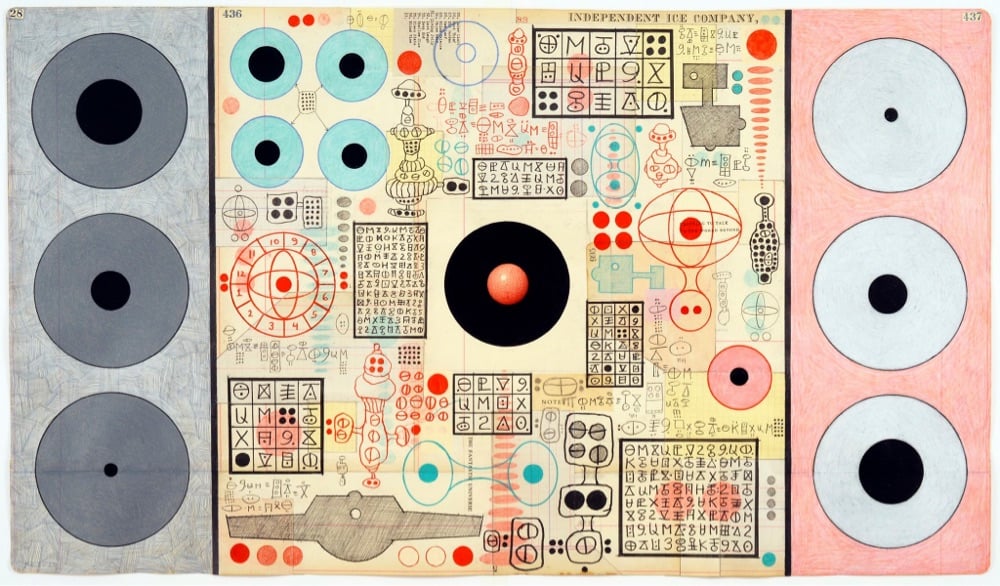
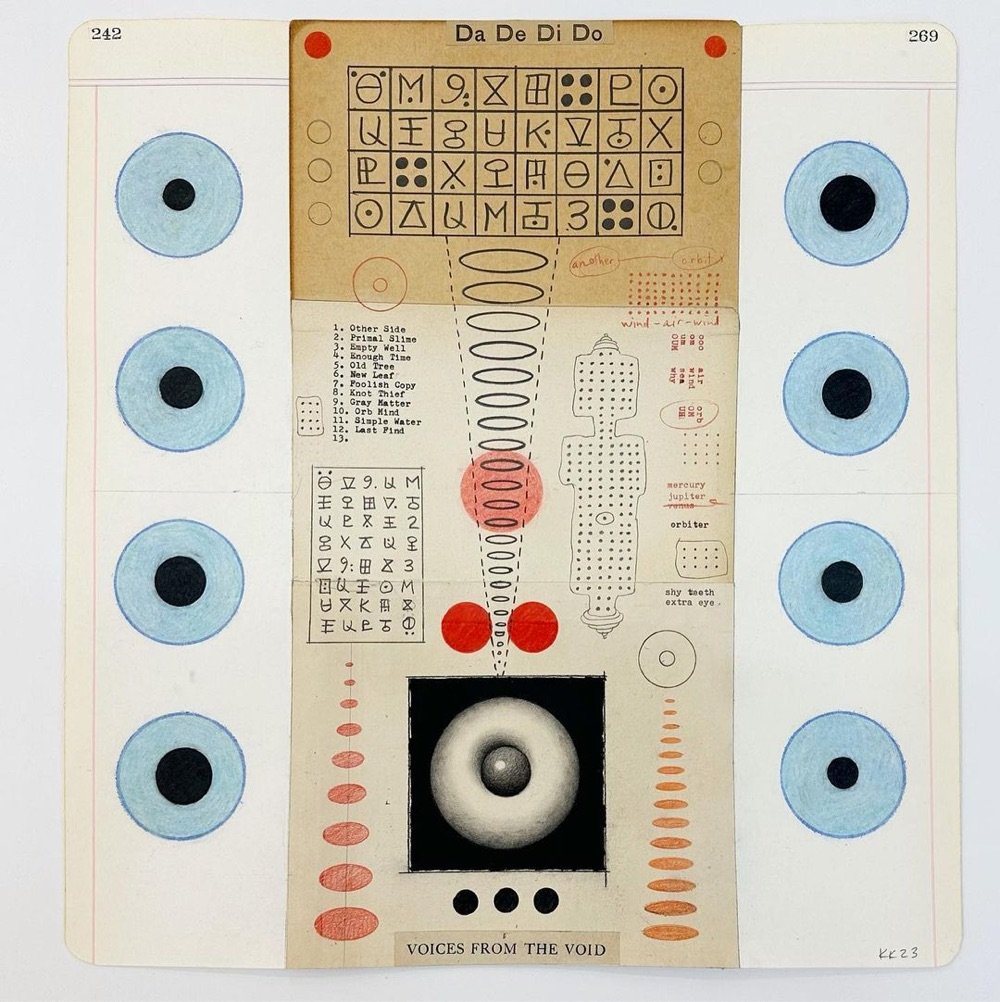

Oh wow, I love these spaceship paintings from Karla Knight. They’re from a series called 33 Spaceships for Another Planet but she’s been doing these diagrammatic/picographic paintings and drawings for some time now. It’s fun to back through Knight’s older work and see how her ancient yet futuristic style evolved. Here’s my best stab at a succinct description of her aesthetic: imagine Hilma af Klint as the production designer for Wes Anderson’s Stargate.
Julia Evans’ list of tactics for soliciting good comments on blog posts is excellent. I’ve been thinking about blog comments recently and this is helping me work through some things.
A digital museum of video game levels that you can walk through and fly around. Mostly Nintendo for now it looks like.
Thoroughly enjoyed this piece about secret family recipes that were actually copied from cookbooks and boxes of ingredients, including a deathbed admission about a treasured fudge recipe: “It’s on the side of the marshmallow fluff container.”
Chaos, Reconsidered: A Spectacular Flyover of Martian Volcanic Terrain
This short, relaxing, mesmerizing video of an Martian impact crater called Aram Chaos was taken by the HiRISE camera on the Mars Reconnaissance Orbiter. The images were run through an enhanced color red-green-blue filter, which tends to highlight the structure and geology rather than the true color. For example, the blue in the video often represents basalt, an igneous rock of volcanic origin.
Tsar Bomba, tested by the USSR in 1961, was the most powerful nuclear weapon ever created. It was so big it didn’t fit inside the aircraft, the mushroom cloud was 40 miles high, and the flash was visible from Norway & Alaska.
Game designer Luc Bernard has designed a Holocaust museum for Fortnite. I don’t think it’s live yet, but the code is 4491-8501-3730 for when it launches.
Always Worth a Look: the AIGA’s Best Book Covers of the Year
You know me; I love a good book cover. The AIGA’s annual roundup of the best designed books and covers is usually aces and the results of the 2022 competition (announced at the beginning of July 2023) is no exception. Here are a few I picked out that I didn’t feature in The Best Book Covers of 2022 back in December.
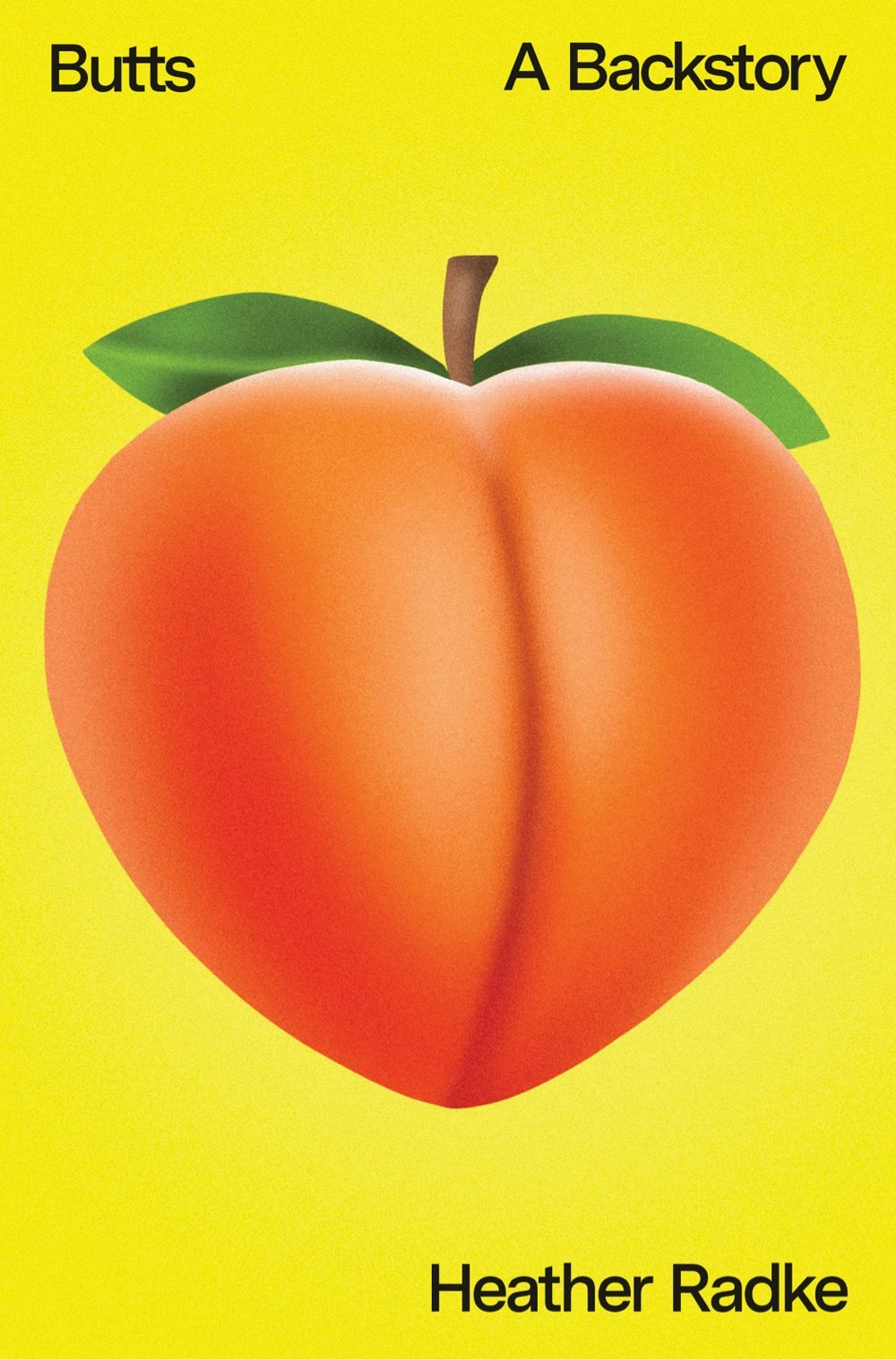

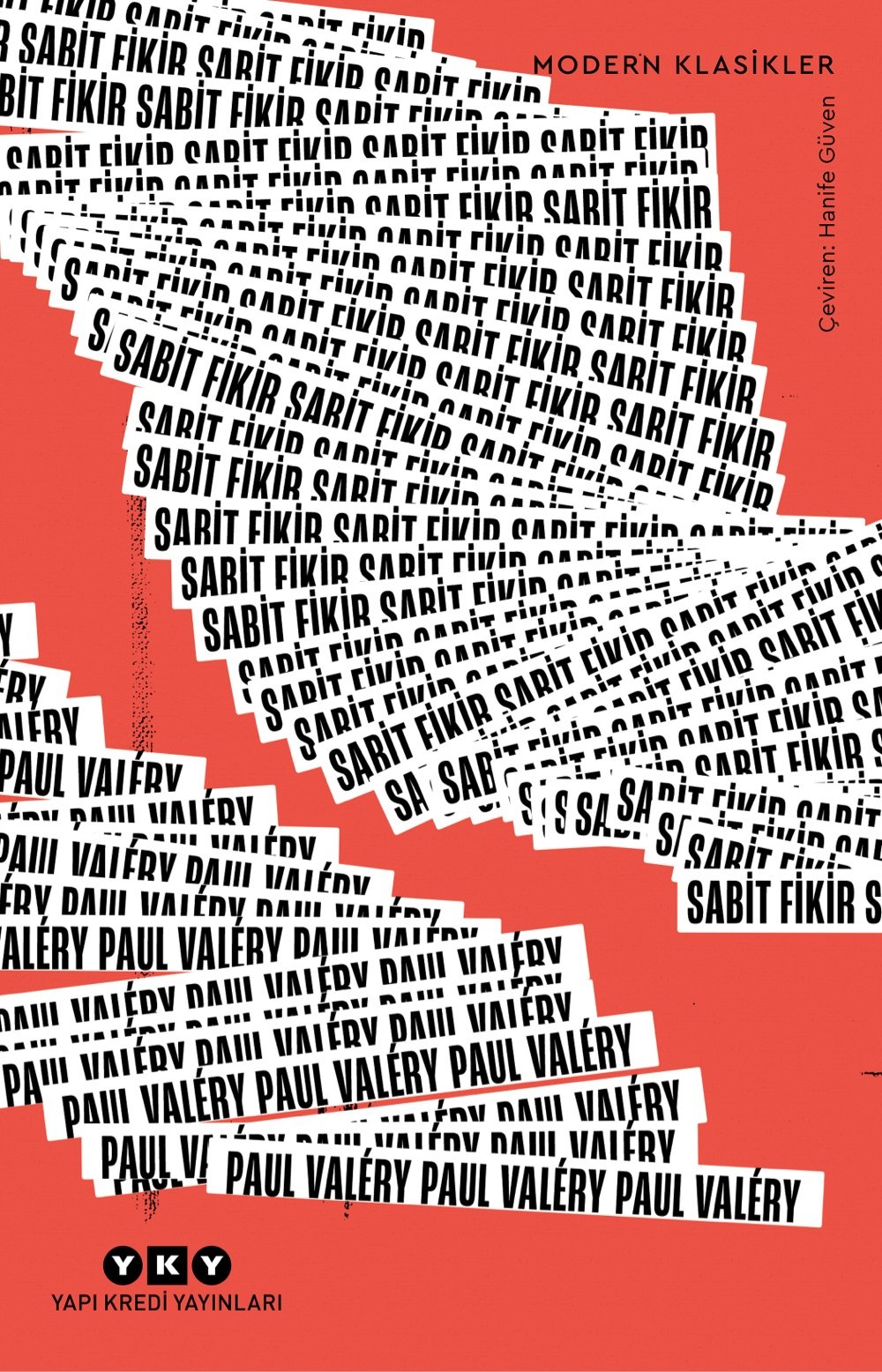
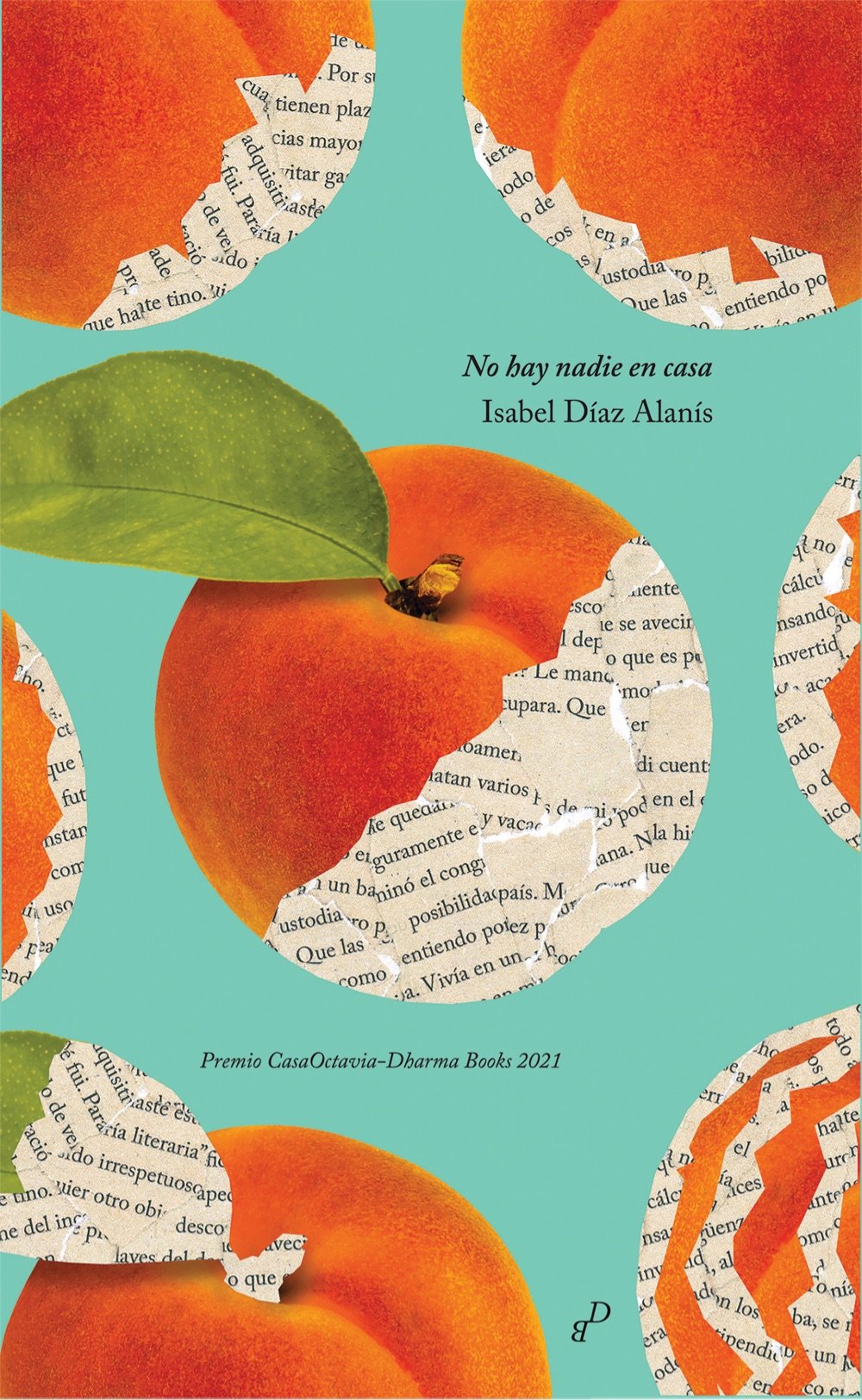
Uh, I guess I’m really into orange today? Anyway, these covers are from:
Butts: A Backstory by Heather Radke.
Sound Within Sound: Radical Composers of the Twentieth Century by Kate Molleson.
Sabit Fikir by Paul Valéry.
No hay nadie en casa by Isabel Díaz Alanís.
Flashback, a weekly history quiz from the NY Times; you’re given historical events to put into the correct order on a timeline.
“Climate Change Is Death by a Thousand Cuts”
Andrew Dessler, a climate scientist at Texas A&M, says that the most likely way people will be impacted by the climate crisis won’t be with some big disaster but with a bunch of small changes that add up to something unmanageable.
Let me give you an example of a tiny impact that I just heard about. My wife told me about a new group of members at her gym: active 70-ish-year-olds who used to go on walks around their neighborhood. Due to the unbearable heat in Texas, though, they joined a gym and now walk indoors on treadmills. This story embodies several aspects of climate impacts that everyone should understand.
First, this is an example of non-linear climate impacts. Although temperatures have been rising gradually over the last century, it was only recently that they crossed a critical threshold that made outdoor walks literally unbearable for these people.
Second, this is what adaptation to climate change looks like. Contrary to how it is typically portrayed by climate dismissives, adaptation is not free. These people are paying $50 per month for the gym membership that is an inferior replacement for something they used to get for free: an environment cool enough to walk in.
So these people are worse off financially and not getting as good of an experience as they used to. And they’re the lucky ones — they have the opportunity and resources to do this.
There’s also the non-monetary costs of adaptation. When it’s too hot to go outside during the day, you are a prisoner of air conditioning instead of going outside and getting fresh air and exercise. We’ve lost something valuable but difficult to quantify.
Some great points here. Reading it made me think of the gun problem here in the US. The focus is often on the immediate damage that guns do (mass shootings, suicides) but there are hundreds of other ways, large and small, in which guns make Americans’ lives worse. For many people, the number of guns in this country and the hard-line views held by those who own them add up to a general vibe of feeling unsafe and under threat. For me, it definitely seems like “we’ve lost something valuable but difficult to quantify” by allowing so many guns to exist in our communities.
“Crinkle crankle walls” (ribbon shaped walls) actually use fewer bricks than a straight wall because they are stable at a thickness of one brick while a straight wall needs a thickness of two bricks.
The Expressive Illustrations of Felicia Chiao



I really enjoyed taking a spin around Felicia Chiao’s Instagram (previously) — it’s chock full of vibrant, expressive and dreamy work. Oh and take a look at her sketchbook tours — and you can buy a reproduction of her 6th sketchbook here (here too).
Author Michael Chabon digitally recreated the science fiction & fantasy section of his childhood bookstore — “a look back at the visuals that embodied and accompanied my early aspirations as a writer”. Bigger here.
For the First Time, There’s a Pill for Postpartum Depression. “Because the pill works faster than other antidepressants and is taken for only two weeks, it may encourage more treatment of the debilitating condition.”
Car Bloat: “Huge Cars Are Terrible for Society”

David Zipper, who researches and writes about mobility and transportation, recently did a big thread on Mastodon (and Bluesky) about car bloat: the way in which cars and trucks have gotten much bigger and heavier in the US over the past few decades and how it’s bad for society. The whole thread is worth a read…here are a couple of Zipper’s points:
Tall vehicles have bigger blind spots and are more likely to strike a person’s torso or head. Heavier vehicles exert more force crashing into a person, bicycle, or smaller car. They also have longer braking distances.
Heavier cars exert more pressure on tires, eroding them faster. Tire particles are absorbed into water, where they damage ecosystems. They also float through the air, harming human health when ingested.
For further reading, Zipper links to a number of pieces he’s written in recent months: The Blatant Greenwashing of SUVs, EVs Are Sending Toxic Tire Particles Into the Water, Soil, and Air, Carry That Weight, and The Car Safety Feature That Kills the Other Guy. Zipper’s solution to these problems is government action: for example, taxing vehicles by weight, testing vehicles for pedestrian and cyclist safety, or requiring drivers have commercial driver’s licenses for larger vehicles.
The image above is from Carsized and compares a 2018 Dodge Ram to a 2005 VW Jetta.
Data Baby: My Life in a Psychological Experiment, a forthcoming book by my pal Susannah Breslin. “What if your parents turn you into a human lab rat when you’re a child? Will that change the story of your life? Will that change who you are?”
Here’s What World-Class Scrabble Looks Like
Scrabble is one of those games where pro/expert gameplay differs so much from amateur/novice gameplay that it might as well be a totally different game. In this entertaining recap of the finals of the 2023 Scrabble World Championships, former US champ Will Anderson explains how finalists David Eldar and Harshan Lamabadusuriya think and strategize throughout the best-of-seven series.
Gameplay aside, the thing that stood out for me is how many of the words played I’d just never heard of before. Like, at least 60% of them. Like I said, it’s just a completely different game at the expert level, with a shit-ton of memorization required. I don’t play Scrabble for this reason — because if you don’t have a bunch of two-letter words and Q,Z, & X words memorized and you’re playing against someone who does, it’s not fun. But it is fun to see two heavyweights of the game go at it on equal terms. (via peterme)
Paul Reubens Never Got the Critical Reappraisal He Deserved. “For Reubens in particular, the homage paid to him comes with the sad sting of too little, too late.”
Why haven’t internet creators become superstars? “Bella Poarch can get a half-billion views in one year on TikTok but the caliber of companies reaching out to her for celebrity sponsorship deals is HyperX High Quality Gaming Gear, not LVMH.”
An Animated Figure Battles Mathematics
It is astounding to me the number of YouTube channels that I have never heard of with subscriber bases larger than that of many countries. (This goes double and triple for Instagram and TikTok.) Alan Becker has over 23 million subscribers and makes videos pitting animated characters against various other entities. His latest video is Animation vs. Math and it is super nerdy and engaging. You might have to be a bit of a math nerd to enjoy this fully, but even if you only get the gist of what’s going on (like I did for at least half of the video), it’s still pretty entertaining. You can check the comments for an explanation of the math or this illustrated explainer.
New book by Roxane Gay is out this fall — Opinions: A Decade of Arguments, Criticism, and Minding Other People’s Business.
This is lovely: Sheila E. runs across someone playing her song The Glamorous Life on a portable speaker at the mall and something surprising happens that I do not want to ruin…
Five Crises Republicans Made Up to Distract & Harm Americans
In a June piece for The Guardian and the video above from just a few days ago, Robert Reich outlines five crises — including wokeness, the trans panic, and critical race theory — that Republicans have manufactured in order to deflect from their true agenda.
Virginia governor Glenn Youngkin’s “day one” executive order banned the teaching of critical race theory. DeSantis and Greg Abbott, the Texas governor, have also banned it from schools.
Here again, though, there’s no evidence of a public threat. CRT simply teaches America’s history of racism, which students need to understand to be informed citizens.
Banning it is a scare tactic to appeal to a largely white, culturally conservative voter base.
However, I would argue that Reich needed to go a bit further. While the crises are inventions, their consequences go beyond mere distraction and into the territory of active harm, particularly of queer and trans people, Black people, and people of color. That’s why I modified the title from his original.
A vintage toaster museum. Types of toasters include perchers (“the bread stands alone”), drive thrus (“the bread drives thru the toaster”), and droppers (“the bread falls through a trap door”).
Don’t post photos of your boarding pass on social media. “Your frequent flier number, name, and PNR are valuable for identity theft, enabling fraud like opening credit card accounts or making unauthorized purchases.”
The Weirdest and Most Chaotic Soccer Match Ever
In the 1994 Caribbean Cup qualifying group stage match between Barbados and Grenada, the 90 minutes of normal time ended with an intentional own goal by Barbados and then with Grenada trying to score either a goal or an own goal and Barbados defending both nets. Say what?! How did this happen?
Well, it was the confluence of a few things:
- The match would go into overtime in case of a tie.
- The “golden goal” rule was in effect for overtime…the first goal wins and the match is immediately over. Oh, and the goal is worth 2 goals, not just one.
- To qualify for the next round, Barbados not only needed to win the match, they needed to win it by two goals…a one-goal difference would not be enough.
I found out about the match by reading this SBNation article but Wikipedia does a better job in clearly explaining why that combination of factors resulted in chaos:
The match started off routinely and Barbados scored the first two goals, establishing the two-goal winning margin they required: in the 83rd minute, the game changed when Grenada scored a goal, which would take Grenada through to the finals unless Barbados could score again.
Barbados attempted to score for the next few minutes, but as time ran out they switched to a different strategy: tying the game so they could attempt to achieve the two-goal margin with the golden goal in extra-time. In the 87th minute, they stopped attacking, with Barbados defender Terry Sealey and goalkeeper Horace Stoute passing the ball between each other before Sealey intentionally scored an own goal to tie the game at 2-2.
With just three minutes of normal time left, the Grenadian players caught on to the Barbadians’ plan, and realised that they would advance in the tournament by scoring a goal in either net, since they would still qualify for the finals with a 1-goal loss. This saw normal time finish in a highly unusual manner, with Grenada trying to score a goal in (and Barbados trying to defend) both nets. For the next three minutes, Barbadian players successfully defended both sides.
As 90 minutes had expired with the score at 2-2, the game went on to extra time, where the winning “golden goal” would count double — thus, Barbados only had to score once to qualify for the 1994 Caribbean Cup. Trevor Thorne scored the winning goal for Barbados to advance to the next round with a score of 4-2.
Venus flytraps are calculating and efficient killers. “The fly, by fighting for its life, tells the plant to start killing it, and how vigorously to do so.”
Japan’s Hayabusa-2 spacecraft returned physical samples from an asteroid called Ryugu and recent analysis shows that they contain “tiny grains of rock made from stars that died before the Sun ever existed”.
Why US Malls Are Dying (And European Malls Aren’t)
From Adam Kovacs’ YouTube channel Adam Something comes this brisk 10-minute video essay on why European malls are doing better than their American progenitors. I thought his third point, about poor urban planning, was particularly interesting: malls tend to fail in America because they are not integrated into the fabric of towns and cities (because very little is integrated into the fabric of cities and towns in many places these days).
Malls, hell, all commerce has to be an organic part of towns and cities. People should be able to get to them by means other than a car, and conveniently. Such integrated commercial spaces are far more resilient. If your commercial spaces aren’t resilient — if you just plop a big box outside the town — don’t be surprised when it goes bust in a few years. And then it’s bulldozed for the next thing to be put up for it to go bust the same way and then get bulldozed and then the next thing and the next and the next so on and so forth.
When this species of water beetle gets eaten by a frog, rather than accepting its fate to be digested, it crawls through the frog’s bowels and emerges through its butt. “The quickest run from mouth to anus was just six minutes.”
Thalassotherapy: salt water therapy. I love the ocean and I always feel so much better when I am around it.
Wonder Is Steven Spielberg’s Blockbuster Secret Ingredient
Starting with Jaws, his first big blockbuster movie that defined the genre, Steven Spielberg has filled the audiences of his films with a sense of wonder, that alchemical mix of fear and astonishment of the unknown. No other director does it better and this video essay explores how he does it.
Forthcoming book from my pal Russell Davies — Do Interesting: Notice. Collect. Share. “Interesting isn’t a personality, it’s a decision. Don’t hunt for diamonds. Get fascinated by pebbles.”
Spotify playlist of songs from the vinyl records found in James Baldwin’s house after his death in 1987. Over 24 hours of music, incl. Nina Simone, Stevie Wonder, Aretha Franklin, and Diana Ross.
The Beautiful Isolated Vocals for Sinéad O’Connor’s Nothing Compares 2 U
The music for Sinéad O’Connor’s 1990 smash hit Nothing Compares 2 U is already pretty stripped down to emphasize the vocals, but in this video, the vocals are almost fully isolated so you can really hear the clarity and emotion in that wonderful voice of hers.
The song was apparently recorded in one take:
“I actually think the intensity of Sinéad’s performance came from the breakup of her latest relationship,” opines Chris Birkett, who co-produced and engineered the track as well as the accompanying, Grammy Award-winning album, I Do Not Want What I Haven’t Got, which topped the Billboard 200 for six weeks and sold seven million copies worldwide. “She had been dating her manager, Fachtna O’Ceallaigh, who’s a really good guy and had been instrumental in getting her deal with Ensign Records. However, their relationship had gone pear-shaped and they were in the process of breaking up when we recorded ‘Nothing Compares 2 U’, so that’s probably why she did such a good vocal. She came into the studio, did it in one take, double-tracked it straight away and it was perfect because she was totally into the song. It mirrored her situation.”
(via openculture)
If you’re in a reading slump, maybe try a graphic novel. If you’re have trouble getting into the reading flow, it can be “immensely satisfying to pick up a graphic novel and read it cover to cover in one sitting”.
For hip-hop’s 50th anniversary, 50 artists reflect on it in their own words: Kool Moe Dee, Cardi B, Lil Wayne, Big Boi, Eve, Vanilla Ice, RZA, and LL Cool J.
Radiohead x Kendrick Lamar
A NYC DJ named Dwells released this mashup of Radiohead’s Everything In Its Right Place and Kendrick Lamar’s N95 back in March and I love it:
You can also find it on Soundcloud and Bandcamp. I ran across it when Radiohead shared a snippet of it on TikTok.
FWIW, Dwells seems to be the same DJ Dwells that won the NYC regional of the prestigious DMC DJ competition when he was just 13 years old. (via @jessicabrillhart)
Arizona is now so hot that it’s killing off saguaro cacti. “These plants are adapted to this heat, but at some point the heat needs to cool down and the water needs to come.”
Researchers at Carnegie Mellon have figured out how to make AI models like ChatGPT serve up prohibited material by sending it nonsensical text strings…sort of like a buffer overflow or SQL injection attack.
California’s free prison calls are repairing estranged relationships and aiding rehabilitation. “Rather than rushed conversations [during formerly expensive calls], there’s time for laughter and sharing memories.”
Donald Trump Indicted for Conspiring to Defraud the United States
Yesterday, a Washington DC grand jury indicted Donald Trump for “for conspiring to defraud the United States, conspiring to disenfranchise voters, and conspiring and attempting to obstruct an official proceeding”, aka trying to steal the 2020 presidential election. Heather Cox Richardson lays it out in plain English:
The Trump team used lies about the election to justify organizing fraudulent slates of electors in Arizona, Georgia, Michigan, Nevada, New Mexico, Pennsylvania, and Wisconsin. Allegedly with the help of Republican National Committee chair Ronna McDaniel, they attempted to have the legitimate electors that accurately reflected the voters’ choice of Biden replaced with fraudulent ones that claimed Trump had won in their states, first by convincing state legislators they had the power to make the switch, and then by convincing Vice President Mike Pence he could choose the Trump electors.
When Pence would not fraudulently alter the election results, Trump whipped up the crowd he had gathered in Washington, D.C., against Pence and then, according to the indictment, “attempted to exploit the violence and chaos at the Capitol” to overturn the election results. “As violence ensued,” the indictment reads, Trump and his co-conspirators “explained the disruption by redoubling efforts to levy false claims of election fraud and convince Members of Congress to further delay the certification based on those claims.” On the evening of January 6, 2021, the indictment alleges, Trump and Co-Conspirator 1 called seven senators and one representative and asked them to delay the certification of Biden’s election.
Here also is the full 45-page indictment, annotated by the NY Times (gift link). The gist of the indictment is, yes, the attempts that we all saw Trump making in broad daylight to stay in power despite his clear election loss were real, serious, and harmful.
One important aspect of the indictment that neither of them picked up on was pointed out by Adam Serwer on Bluesky:
The indictment makes clear that Donald Trump and his accomplices planned to seize power by force and then maintain that power through the mass murder of American citizens by their own military.
That sounds pretty serious — here’s what the indictment says:
On the afternoon of January 3, Co-Conspirator 4 spoke with a Deputy White House Counsel. The previous month, the Deputy White House Counsel had informed the Defendant that “there is no world, there is no option in which you do not leave the White House [o]n January 20th.” Now, the same Deputy White House Counsel tried to dissuade Co-Conspirator 4 from assuming the role of Acting Attorney General. The Deputy White House Counsel reiterated to Co-Conspirator 4 that there had not been outcome-determinative fraud in the election and that if the Defendant remained in office nonetheless, there would be “riots in every major city in the United States.” Co-Conspirator 4 responded, “Well, [Deputy White House Counsel], that’s why there’s an Insurrection Act.”
And this:
Also on January 4, when Co-Conspirator 2 acknowledged to the Defendant’s Senior Advisor that no court would support his proposal, the Senior Advisor told Co-Conspirator 2, “[Y]ou’re going to cause riots in the streets.” Co-Conspirator 2 responded that there had previously been points in the nation’s history where violence was necessary to protect the republic. After that conversation, the Senior Advisor notified the Defendant that Co-Conspirator 2 had conceded that his plan was not going to work.
HuffPost explains who Co-Conspirator 4 is (top Trump DOJ official Jeffrey Clark) and what the Insurrection Act is all about. Co-Conspirator 2 is John Eastman, one of Trump’s lawyers.
Trump and his team were going to unlawfully (and immorally, I would argue) seize power and quell protests with military force by claiming there was a rebellion against the government or that public safety was at stake. Whether the military would have gone along with it (if Pence had chosen to play his part) is unknown, but it’s pretty incredible how close we came to the United States very quickly devolving into a dictatorship. This fucking traitor must be held accountable for his crimes and must not ever be allowed anywhere near any public office in the United States ever again.
Update: Updated the post to add a second passage from the indictment about the use of state violence to quell protest.
The trailer for season two of Loki. The MCU has been struggling lately, but I will cautiously say that it looks promising?
The Barbie Breakup: After seeing Barbie, some women are “deeply reconsidering” their relationships. “AITA for breaking up with my boyfriend over the Barbie movie?”
Habsburg AI: “a system that is so heavily trained on the outputs of other generative AIs that it becomes an inbred mutant, likely with exaggerated, grotesque features”.
The new energy efficiency rules that go into effect in the US today mean that stores can no longer sell incandescent light bulbs. They had a good run.
How Cruise Ships Got So Big
Cruise ships are a relatively new human invention that look quite different from other ships. Oh, and they are absolutely massive. How did they get that way?
The predecessor of today’s cruise ships was the ocean liner: big, beautiful ships that sailed across the Atlantic. But ocean liners had a totally different purpose from cruise ships: They were for transportation. Everything about them was designed to facilitate an ocean voyage from one continent to another.
But air travel changed that. Planes eliminated the main reason to take a ship somewhere, and ocean liner business plummeted. So the industry pivoted and began selling a ship as the destination itself. The cruise ship was born. But the ocean liners, built for a voyage, weren’t ideal for the purposes of a cruise, and over the next few decades, the cruise ship began its evolution. And it has culminated in the behemoths we see today.
Cruise ships always make me think of David Foster Wallace’s classic piece, Shipping Out (which you might know as A Supposedly Fun Thing I’ll Never Do Again).
The Bear’s Best Ingredient Is Tenderness
[Note: If you’re reading/watching this, I assume you’ve watched season two or don’t care about spoilers; they abound.] The Bear is an intense show about a group of intense people doing an intense job. It can be tough to watch sometimes because people often communicate by screaming and yelling at each other. As Evan Puschak observes in this perceptive video essay, the second season delves into where some of those behaviors came from (surprise: childhood trauma) and offers a counterbalancing force: tenderness, listening, and paying attention.
Hmm, it seems like the “attenzione pickpocket” lady featured in the NY Times is associated with a conservative anti-Roma party and her pickpocket monitoring might just be “a campaign of racist harassment against the Roma community”.
A French comic from 1967 called Valérian et Laureline is an unacknowledged influence on the Star Wars films.
Venice’s Cittadini Non Distratti (the undistracted citizens) patrol the streets to LOUDLY call attention to pickpockets: “Attenzione, borseggiatrici! Attenzione, pickpocket!”
See How Pencils Are Made in a Japanese Factory
I have said previously that “even on my busiest day, I will drop everything to watch a video of pencils being made”. Still true! This video from Process X of a Tokyo pencil factory really hits the spot. My favorite part of watching pencils get made is always the sharpening of the finished pencils by belt sander.
See also How Pencils Are Made, A Visit to an American Factory That’s Been Producing Pencils Since 1889, and A History of Pencil Lead and How Pencils Are Made. (via the kid should see this)
Miyazaki’s Magical Food: An Ode to Anime’s Best Cooking Scenes. “Food and eating is so closely associated with family and emotion. It’s a really important part of the actual storytelling and scenesetting.”
Bonkers story about a newspaper that sniffed out corruption and wrongdoing in a small-town sheriff’s department in Oklahoma. One of their headlines flatly declared “Sheriff Regularly Breaking Law Now”.
Words from Hell: Unearthing the Darkest Secrets of English Etymology. “Dirty-minded word nerds and lewd linguistics lovers will derive unadulterated pleasure in leering at the origins of swear words, sexual lingo, inappropriate idioms…”




Stay Connected